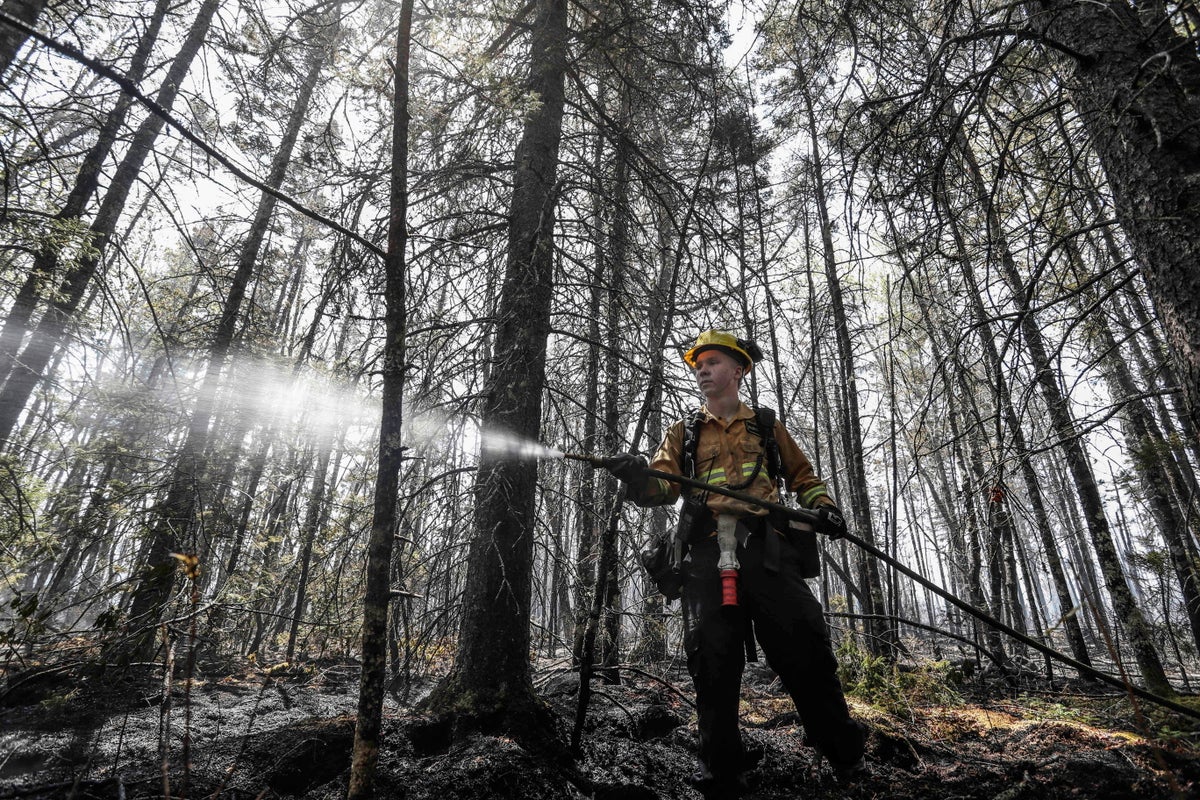
Rain on Friday and a rainy forecast for the weekend have fire officials hopeful they can get the largest wildfire ever recorded in Canada’s Atlantic Coast province of Nova Scotia under control.
That wildfire and three others in the province have prompted air quality warnings in U.S. regions as far south as Virginia and Maryland.
“My weather app says 80% change rain. Giddy up to that,” Halifax Mayor Mike Savage tweeted.
The massive Barrington Lake fire in Nova Scotia’s southwest is now considered the province’s largest wildfire on record. Burning more than 200 square kilometers kilometers (more than 75 square miles) in Shelburne County, the big blaze continues to withstand round after round of water bombers and air tankers dropping water and fire retardant from the cloudy skies.
But rain is forecast in that area and for the provincial capital, Halifax, where another wildfire has forced the evacuation of thousands. The wet weather is set to continue from Friday into Monday and Tuesday next week.
“We’re really hopeful with this break in the weather that we can really get in and do some positive work,” Dave Rockwood, public information officer for the Department of Natural Resources and Renewables, told The Canadian Broadcasting Corporation early Friday.
He said he was quite hopeful that a much smaller fire near the town of Shelburne, which is home to 1,300 people, could end soon.
“I’ve never been so happy to see rain,” Halifax Deputy Fire Chief David Meldrum said. He said it wasn't enough yet, but that officials were hopeful about the current forecast.
The fires in Shelburne County, which have been burning since Sunday, have forced more than 5,000 people from their homes and cottages, 50 of which have been consumed by flames.
Spring in Nova Scotia was unusually dry. The province received about half the usual amount of rainfall in April, according to the Earth Observatory of the US space agency, NASA.
Meanwhile, some residents of subdivisions northwest of Halifax have been told that their homes were destroyed by the fast-moving fire after they were evacuated earlier this week.
Fire officials said 200 structures, including 151 houses, were claimed by the fire in suburban Halifax, which has been burning out of control for nearly a week, as has the Barrington Lake fire. In all, 16,000 Halifax-area residents have been evacuated from their homes.
On Thursday, fire officials said that 50% of the Halifax fire had been contained though it still was out of control. No injuries or missing people have been reported in that fire, the Halifax mayor said.
U.S. officials as far south as Maryland, Baltimore, Virginia and Pennsylvania reported being impacted by the Canadian wildfires.
The National Weather Service in Wakefield, Virginia, issued an air quality alert for Friday for the Richmond, Virginia area due to smoke from wildfires across the northeast and Atlantic Canada.
St. Mary’s County Department of Emergency Services, located about 80 miles (about 130 kilometers) south of Washington D.C., warned residents in a tweet on Thursday that air quality might be impacted by the fires in southeastern Canada.
In Pennsylvania, the Chester County Health Department said Thursday in a tweet that the “smoke & haze from wildfires in Canada continue to linger,” and warned the air could still be unhealthy for older adults, young children and people with respiratory problems.
Similar warnings were issued by the National Weather Service in Baltimore-Washington and the Philadelphia area, including parts of New Jersey, where officials warned sensitive groups to take precautions when going outside. A thick smoke plume was reported over Cape Cod, Massachusetts.







